Apr 2021 2nd Edition
Apr 2021 2nd Edition Londekile
Translations
Boost your business through branding
Boost your business through branding LondekileIf you are a small business owner rebuilding your business after Coronavirus Disease (COVID-19) setbacks, branding is one of the tools you need to use to attract customers.
Akintayo Ogunsanya, a marketing and branding expert from North-West University, says if President Cyril Ramaphosa’s call to support the rebuilding of small, medium and micro enterprises (SMMEs) is to be successful, business owners need to work on their branding.
“Branding is for every business, even spaza shops. A business that is a good brand will acquire customers, keep them, become popular, be liked by customers and become profitable. These are the benefits of having a strong brand,” he explains.
Branding plays an important role in attracting customers. Ogunsanya says the following branding tips can help businesses:
- Look at how you can use technology to grow your business. How can you improve your business and satisfy customers?
- Branding is about behaviour, not only a beautiful name and logo. Concentrate on good customer care.
- Never try to do too many things at once. Focus only on things you are sure you have the skills, ability and resources to deliver.
- If possible, set up a free blog. If you are not on the internet, your business could lose out.
- Use digital marketing to sell yourself and reach potential customers.
- Ask your customers for feedback about your product or service and use that information to improve.
- Always learn, watch your competitors, follow trends and see how you can adapt.
Branding assistance for SMMEs
If you want to brand your business, Ogunsanya says: “First do it yourself by reading or downloading materials about branding online. This is where customers mainly spend time. Then, look for government opportunities.”
The following government departments and business support units run various free training programmes, which include marketing and branding. Visit their websites and look for programmes.
National Youth Development Agency: www.nyda.gov.za
Small Enterprise Development Agency: www.seda.org.za
Department of Small Business Development: www.dsbd.gov.za
Bursaries provide hope for a brighter future
Bursaries provide hope for a brighter future SiboneloFour students from the outskirts of KwaZulu-Natal (KZN) have jetted off to the University of Cape Town (UCT) to study medicine, after receiving funding from the provincial health department.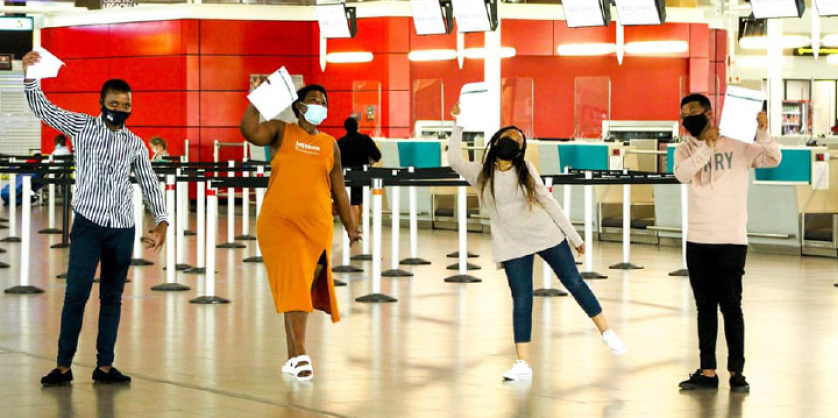
Thembelihle Tsengane (18), Sibahle Ntuli (18), Bongeka Sibiya (17) and Lwazi Mhlongo (17) were commended for attaining top matric marks, despite the challenges and disruptions caused by the Coronavirus pandemic.
While they had been accepted to study at UCT, they had no funds to do so. Concerned community leaders told the KZN Department of Health about the students’ plight and the department came to their rescue.
KZN Health MEC Nomagugu Simelane-Zulu says the department usually has bursaries available, but did not have them this year due to financial strain caused by the pandemic.
When the department listened to the students’ stories, it felt it had to help them.
National Health Insurance
MEC Simelane-Zulu says the department is pleased to fund youth from rural communities, as the National Health Insurance (NHI) will create a need for more doctors.
The NHI will enable every South African to receive access to quality healthcare, whether they are poor or rich.
After their studies, it is hoped the students return to KZN to serve their rural communities, where there is a shortage of doctors.
“One of the NHI’s strategies is to ensure that every clinic has a doctor, whether it is in a rural area or not. You can only do this by ensuring that you increase the number of doctors that you are producing. This is a contribution towards that,” says MEC Simelane-Zulu.
Ntuli says securing funding to attend university would have made his recently-buried 83-year-old grandmother happy. Just before she passed away, she gave him money from her small pension.
“Gogo said I must take the money and buy myself a suitcase as I was going to university. Even though I hadn’t received a bursary and didn’t know how my studies would be financed, she somehow knew that I would be going to UCT,” says Ntuli.
For more information about the department’s bursaries, which are usually awarded every year, call 033 395 2733 or visit www.kznhealth.gov.za/bursaries
Capturing crime
Capturing crime SiboneloSouth African traffic officers will be issued with body cameras to help gather evidence and improve the conviction rate for traffic law violators.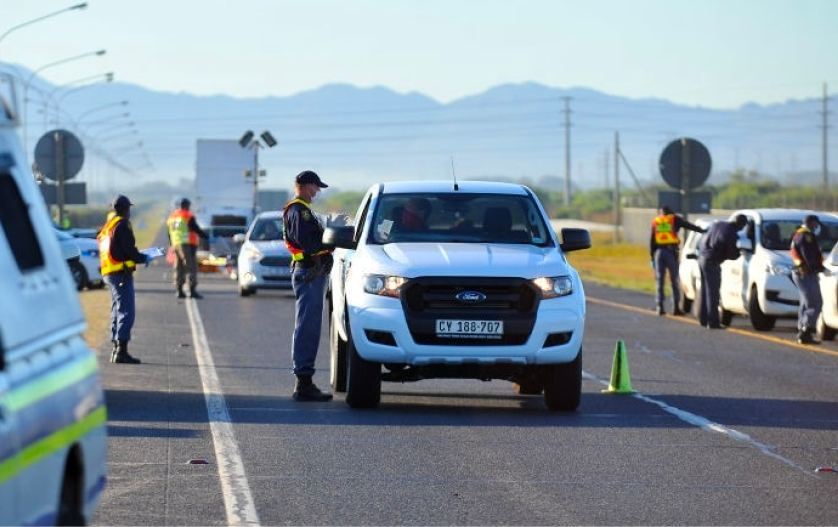
Deputy Minister of Transport Dikeledi Magadzi says South Africa is ready to issue traffic officers with body cameras in the coming years.
“As the Road Traffic Management Corporation (RTMC) rolls out the use of body cameras... we aim to improve the levels of service and ensure that this is executed to serve and protect our road users,” she says.
The cameras will also act as a deterrent for corruption, effectively preventing officers from soliciting or accepting bribes from motorists.
“Every interaction a traffic law enforcement officer has with a motorist will be recorded. There will be nowhere to hide for those who live beyond their means and finance their lavish lifestyles through bribes, at the expense of the law abiding citizens on the roads.”
Deputy Minister Magadzi says traffic law enforcement has no place for unethical, greedy and corrupt officers.
Government is also strengthening law enforcement by investing in drones.
“These drones will assist to proactively identify hazards on the roads, and to identify motorists who are driving recklessly and at unacceptably high speeds.
“Officers will then be deployed strategically to respond, using the live intelligence supplied by this technology,” the Deputy Minister explains.
Discussions are underway with the Justice Crime Prevention and Security Cluster to ensure that evidence gathered through the use of these drones is admissible and leads to a higher conviction rate.
Highlighting the importance of road safety, the Deputy Minister says most fatal crashes happen at night.
She encourages road users to avoid travelling at night and to observe curfew hours, to avoid the dangers that are mostly prevalent at night.
“Road safety is our collective responsibility. It is equally through collective effort that we can force a change in our behaviour on the road,” the Deputy Minister says.
– SAnews.gov.za
Disability does not deter Knysna crafters
Disability does not deter Knysna crafters LondekilePeople with disabilities in Knysna in the Western Cape have been taking charge of their lives through training in carpentry, stenciling and sewing.
The Knysna Association for Persons with Disabilities (KAPD), which recently received almost R100 000 in grant funding from the National Development Agency (NDA), trains 25 beneficiaries at its workshop, called Die Werkswinkel, in Hornlee.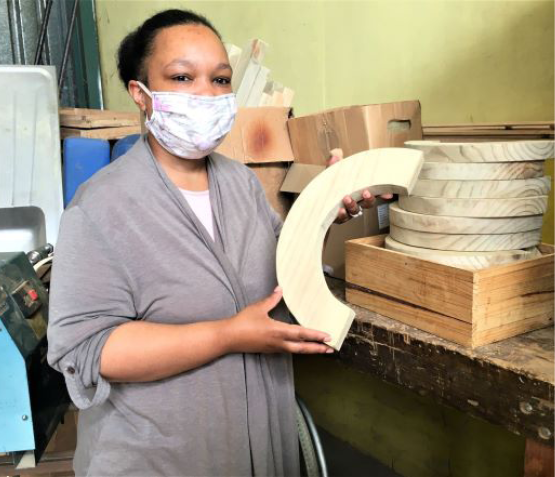
The skills programme teaches participants how to make furniture, dog kennels, coffins, cushions, bags and aprons. These are sold to locals and tourists at a shop at Knysna’s Woodmill Lane shopping centre.
“The work we do here restores dignity, instills independence and gives purpose to our beneficiaries.
“We want to grow our market base as we will offer even more products in less time and are open to linkages with other organisations,” says Veronique Fortune, the manager of KAPD.
The manager of Die Werkswinkel, Edwin Pedro, who has a polio-related disability and needs crutches to walk, says he has gained 27 years of experience, thanks to the KAPD.
He works with two qualified carpenters, a builder and glazer, as well as 19 other general workers, who assist with cutting, sanding, varnishing, cleaning, sales and deliveries.
The KAPD has helped mother of three Diane Kleynhans, who has a hearing impairment, put her children through school.
Kleynhans, a skilled seamstress, has been part of the KAPD for 25 years.
“Everything I know, I learnt here. We have helped many people here; some have started their own businesses. For the rest of us, this is our home,” she says.
The association also offers professional social services, upliftment programmes and support groups for parents raising children with disabilities. It also runs the Little Angels day care centre.
NDA’s Western Cape manager Ardiel Soeker says the NDA’s association with KAPD is line with its mandate of poverty eradication.
“We measure the impact by measuring household poverty indicators such as job and income generation opportunities, programme responsiveness to a social issues and sustainability. We are pleased with this partnership and are positive it will yield good results,” says Soeker.
The NDA funding will be used to buy machinery, equipment, materials and resources to improve output and administrative and logistic functions.
For more information contact Die Werkswinkel at 044 385 0126.
Easy-to-find answers for small businesses
Easy-to-find answers for small businesses LondekileA new initiative that will provide business support services to small, medium and micro enterprises in Western Cape communities was recently launched by the City of Cape Town’s Enterprise and Investment Department.
The Mobile Business Hub, as the initiative is called, will visit communities and help with people services related to businesses and address questions, such as:
- Starting and growing a business (‘I want to start a business or expand my business and need support’).
- Red tape (‘I am struggling with a red tape issue, which is hampering my business’).
- City projects (‘I am interested in finding out more about specific city projects and would like to be connected to the relevant officials and line departments’).
- Investing in the city (I want to invest in a new business. What regulatory requirements will I be expected to adhere to?’).
- Enterprise and supplier development (‘I want to do business with the city/government and don’t know where to start).
- Regulatory compliance (‘I want to do business in Cape Town and don’t know which business processes/registrations to comply with’).
City of Cape Town Executive Mayor Dan Plato says it is important to take these services directly to people.
“Businesses are often operating directly within communities and with the Coronavirus pandemic adding limitations and pressures to the way business is done, we need to be more innovative to assist entrepreneurs with growing their skills and expanding their income opportunities,” he says.
Plato adds that it is important to help people start new ventures and empower themselves.
“Small business owners are feeding their family, paying school fees and trying to create security for their family. Through the advice offered by this mobile service, we can help people create their own future,” he says.
The Strand Civic Centre was the first stop for the Mobile Business Hub.
Eric Nangu, owner of school uniform manufacturing firm Nangu Clothing & Projects, approached the hub for help to access finance to buy an embroidery machine and to expand his business.
Nangu says he was put in touch with the Small Enterprise Development Agency, an agency of the Department of Small Business Development, and is in the process of applying for funding.
Over the next few months, the Mobile Business Hub will visit a number of communities to offer onsite business support.
To view the Mobile Business Hub’s schedule, visit www.investcapetown.com
Farmer overcomes COVID-19 obstacles
Farmer overcomes COVID-19 obstacles LondekileA young sheep farmer is looking to become a producer of the highest grade Dohne Merino sheep in the Eastern Cape.
Owner of Agric EC Siposetu Jilata (29) explains that this breed is known for its quality wool and meat.
Jilata, who holds a Bachelor of Agricultural Economics degree from the University of Fort Hare, started the farm in 2017, after struggling to find a job.
Through Agric EC, she offers business development consultancy services to people who are in the agriculture sector.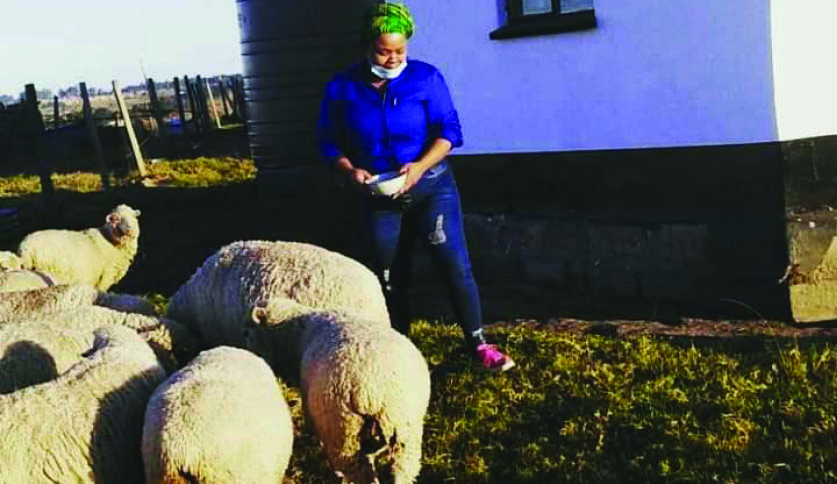
“I help up-and-coming farmers with drawing up business plans, proper documentation to apply for funding and other administration processes that are needed to run a successful commercial farm.
“This part of the Agric EC business works with the Small Enterprise Development Agency and other development agencies, which recommend clients to me when people need to get business development services,” says Jilata.
Unfortunately, the consultancy business took a knock because of the Coronavirus Disease (COVID-19) so Jilata started focusing on the livestock farming side of her business.
The sheep she sells for between R1 800 and R2 200 each have helped keep her afloat.
“COVID-19 slowed down the consultancy business due to people no longer starting farming projects. A lot of people who were using their savings or extra income to start farming enterprises no longer had the appetite for it.
“I had started farming Dohne Merino sheep in 2017 but they were not the main focus of my business until last year, when COVID-19 arrived.
“Then, in an effort to improve the quality of my sheep, I applied for and received two Dohne Merino sheep from the Eastern Cape Department of Rural Development and Agrarian Reform.”
The two rams Jilata received from the department are of a better quality than her current herd. She says she will use the rams to breed and thus improve the quality of the wool and meat produced on her farm.
The donation to Jilata was part of the department’s livestock improvement programme, which is aimed at helping small-scale farmers become more competitive against their established counterparts.
For more information on the programme, contact the Eastern Cape Department of Rural Development and Agrarian Reform at 040 602 5006 or www.drdlr.gov.za.
Farming dream realized after 50 years
Farming dream realized after 50 years LondekileSamson Mahlaba (73) worked as a farm labourer for 50 years before realising his dream of becoming a commercial farmer five years ago.
Mahlaba was a child when he first started working as a labourer on the 300-hectare Hoekieplaas farm in Reitz in the Free State. He never went to school and grew up with his brothers, as his parents passed away when he was six.
Even though he has no formal agriculture training, Mahlaba knew that if he had a farm of his own, his experience would ensure his success.
In Mahlaba’s early years, there were not many black farmers and, for them, owning or leasing land was not often heard of.
Unlike many people he knew who relocated to Gauteng for better opportunities, Mahlaba didn’t follow them or give up on his dream. Instead, he kept wondering whether, one day, the nation and the agricultural sector would value his contribution as a black agriculturist.
“I always dreamt of becoming a farmer because I loved the farm. The farming bug bit and I was hooked, still am, and I remain passionate about the farm,” he says.
Thanks to his long-standing relationship with Coenraad Fick, the owner of the farm and Mahlaba’s mentor, his dream came true in 2015 when Fick retired.
Mahlaba started working for Fick’s father in 1969, when Fick was nine.
After retiring, Fick helped Mahlaba transition from a farm worker to a farmer and he now has a long-standing lease agreement for Hoekieplaas, where he farms cattle, mielies and soybeans with his twin grandsons Karabo and Kamohelo.
As a mentor himself, Mahlaba has taught his grandsons everything he knows about farming.
“The story of the farm is a very long yet heart-warming one, a story which makes me very happy. I worked for very long and I laboured on the farm, to get to where I am today.
“Fick is a good man, and his guidance has helped me as a black commercial farmer a lot. I enjoy farming very much,” he says.
Fick’s mentorship of Mahlaba forms part of agricultural enterprise VKB Group’s programme for developing agriculture, which assists up-and-coming farmers by providing them with knowledge and expertise and exposing them to new technologies.
Mahlaba's inspirational journey has made it to the small screen. He was the first farmer to be featured on For the love of the land, a new TV show produced by Food.
For Mzansi and the VKB Group.
Girl4Tech equips girls for future jobs
Girl4Tech equips girls for future jobs SiboneloRose-Act Saturday School in Johannesburg’s Alexandra township has become the latest full-time global recipient of the Girls4Tech Connect digital programme. 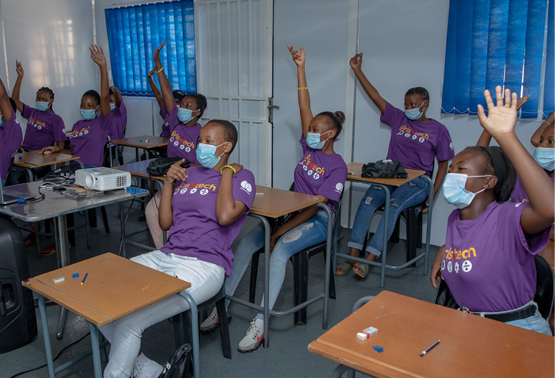
Run by non-profit company Rays of Hope, Rose-Act, which offers extra classes on Saturdays to school learners in and around Alex, is the first South African school to offer Girls4Tech’s new digital programme.
Powered by American payments tech company Mastercard, Girls4Tech is dedicated to preparing participants for careers in science, technology, engineering and mathematics (STEM) fields.
Initially, the international company brought Girls4Tech (not the newer Girls4Tech Connect) to South Africa in 2017, launching at schools in Johannesburg and Cape Town.
Suzanne Morel, country manager for Mastercard SA, explains: “Although it started as a hands-on, in-person session run by employee volunteers, Mastercard enhanced access to its STEM curriculum through a new digital learning experience, namely Girls4Tech Connect. The programme has also expanded to cover topics such as artificial intelligence and cyber security.”
Volunteers show young girls that being friendly, enthusiastic, mathematical, artistic, scientific, logical and creative are all skills that connect to a STEM career.
“A lot of girls believe they are not cut out for technology careers and need more confidence. They need to have good role models so they can see they can do it too,” says Morel.
Bafana Mohale, school manager at Rose-Act Saturday School, agrees, adding that STEM skills are important in today’s digital world, adding that the programme enables the girls to explore, create and learn in a fun and immersive online environment.
In the first lesson the girls learnt about all things digital, cryptology and fraud detection.
“Our collaboration will develop a strong pipeline of talent by encouraging girls to embrace the subjects that will prepare them for the workforce of the future,” he says.
South Africa is committed to improving the quality of its STEM education.
Minister of Basic Education Angie Motshekga, speaking recently about the importance of equipping learners with skills for a changing world, said: “We can’t afford to take our eyes off the ball, about the needs of our learners to acquire new skills for the professions that are yet to be born.”
Have you been tested for TB?
Have you been tested for TB? SiboneloDeputy President David Mabuza has called on South African men to be counted in the nation’s efforts to end tuberculosis (TB) by getting tested.
“Unless men heed this call, the wellbeing of South Africans will forever hang in the balance,” he says.
The Deputy President cited the results of the latest TB Prevalence Survey Report, which found that the infectious bacterial disease was 1.6 times higher in men compared to women in the country.
“Men must be encouraged to test for TB so that they get treated early before they spread the disease within their families and the entire community,” he stresses.
The Deputy President, who is also the chairperson of the South African National Aids Council (SANAC), says the fight against TB is being affected by the Coronavirus Disease (COVID-19).
The capacity, efficiency and effectiveness of national health systems have been strained by waves of infections, hospitalisations and deaths.
TB detections
The national lockdown and movement restrictions also contributed to the disruption of access to health services.
This has led to a reduction in the number of TB detections, as patient contact and tracing services became difficult during the lockdown.
“This pandemic has the capacity to erode the achievements and progress achieved to date in the fight against the spread of TB,” says Deputy President Mabuza.
He notes that South Africa is counted among the 30 countries with a high burden of TB.
Government is determined to meet the goals of the National Strategic Plan on HIV, TB and Sexually Transmitted Infections (STIs).
As part of plan, government aims to diagnose at least 90% of all people infected with TB, while treating 100% of those who have tested positive, and decrease TB deaths by at least 30%.
"This year, the National
Strategic Plan is nearing the finish line, yet the numbers, in terms of targets we had set for HIV, TB and STIs, remain stubbornly high," says the Deputy President.
He adds that government is working hard to reduce new infections from 450 000 to 315 000 per year.
He raised concerns over the latest findings, which shows that 390 000 people became infected with the virus in 2018 in South Africa, while only 60% of them were diagnosed.
“This suggests that there is a large number of people who are walking around with the infection but are not on treatment. That is dangerous, considering that one person infected with TB could potentially infect a further 15 people.”
Health Minister Dr Zweli Mkhize says almost 50 000 people have succumbed to TB annually for the past three years.
Treatment
The Minister says COVID-19 has disrupted not only people’s normal lives but also service delivery, and admitted that government is falling behind in its treatment interventions.
Minister Mkhize says government is working hard to improve communication around TB; civil society engagement, integrate TB, COVID-19 and HIV services; strengthen airborne infection control processes and explore innovative ways to ensure treatment adherence. SAnews.gov.za
Knack for knitting good business
Knack for knitting good business LondekileA young woman turned lemons into lemonade during South Africa’s strict Coronavirus lockdown.
When Tinyiko Mabunda (26), pictured, started a new hobby to keep busy during the tough months of the Level 5 lockdown due to the Coronavirus in 2020, she had no idea that it would lead to her becoming an entrepreneur.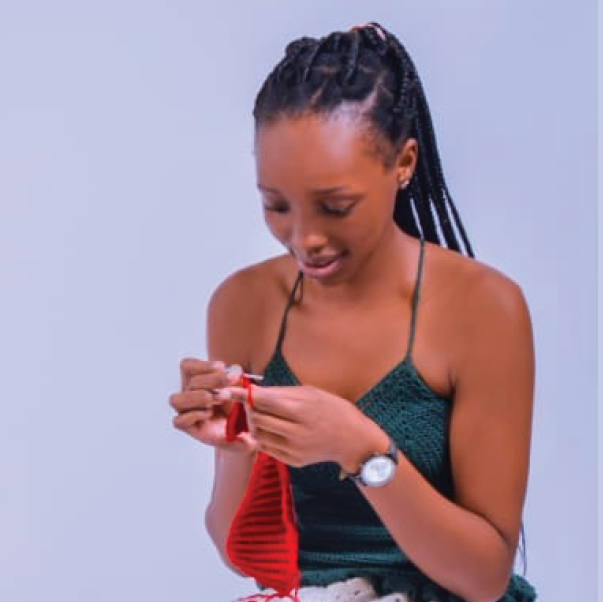
“When I started crocheting with my mom, the aim was not to start a business but to develop a skill. However, after I saw the love people had for my crocheted clothes, I was encouraged to start a business.”
Mabunda, from Bushbuckridge in Mpumalanga, says with shops forced to close, it was hard to find the materials she needed in the initial months of the lockdown.
“My mom came up with the idea of using plastic for my designs and we used that to crochet a summer hat, bag and a waist belt. This taught me that you can start whatever you want, despite minor challenges,” says the Bachelor of Education student.
Although she struggled to master crocheting, Mabunda’s mom didn’t give up on her and, as a result, the young entrepreneur is today producing a range of clothing that includes swimwear, jerseys, cardigans, beanies, skirts, hats and even customised designs. She prides herself on ensuring that her work is neat, as taught by her mother.
“I named my company after my clan name, Vahlave, and believe this will help my business create a legacy not just for me, but for others who will come after my generation,” she says.
Mabunda currently works with a fellow student and community member, Ayanda Lamula, to fill orders and says her vision is to establish a boutique and factory.
“My passion for teaching will manifest in this manner, as I am willing to teach anyone from any part of the country to crochet. I also want to teach children how to crochet because there was a time when our parents were taught how to sew and crochet in school.”
Mabunda says that while formal education is important, the youth should also learn to do crafts and
handiwork.
“This will help them to not focus on one thing. If people earn a qualification but cannot find employment, they will then be able to create a living for themselves and support their families,” she adds.
Learn more about freedom
Learn more about freedom LondekileTake a trip this Freedom Day to understand a little more about the history of South Africa and why we celebrate this great nation on 27 April.
Visiting historical sites across South Africa can help you to better understand the country’s rich history and give you a greater appreciation of Freedom Day.
Freedom Day is celebrated annually on 27 April to commemorate the first post-apartheid national and democratic elections held in South Africa on that day in 1994. It was the first time that anyone over 18 could vote, regardless of their race.
Vuk'uzenzele highlights some of the affordable places you can visit to learn more about South Africa’s history, including its stormy past, unique architecture and languages:
The Apartheid Museum
The Apartheid Museum illustrates what life was like for South Africans under the apartheid system. It brings together a collection of dramatic photographs, videos, press clips, personal artefacts and moving stories.
The museum is situated at the Gold Reef City campus in Ormonde, Johannesburg.
The museum has permanent and temporary exhibits put together by a team of designers, historians, curators and film-makers.
Visitors can either book a guided tour or view the exhibits at their own pace.
Admission
- Adults: R85
- Pensioners, students and children: R70
- School children: R40
- Teachers: R45
Visiting hours
Monday – Friday: 9am – 5pm
For more information, visit www.apartheidmuseum.org, call 011 309 4700 or email info@apartheidmuseum.org.
The Nelson Mandela Capture Site
The Nelson Mandela Capture Site is situated outside Howick in KwaZulu-Natal. It commemorates the day former President Nelson Mandela was arrested on 5 August 1962.
It gives visitors a moment in history with a visitor centre and a world renowned sculpture. Following his arrest, the late President spent the next 27 years of his life in prison.
Admission
- Under 12: Free
- Aged 12 to 18: R30
- Adults: R100
- Adults 60 and over: R60
- Scholars and teachers: R30
Visiting hours
Monday – Sunday: 9am – 5pm.
For more information, email: info@thecapturesite.co.za or call 072 351 0967.
The Castle of Good Hope
The Castle of Good Hope in Cape Town is the oldest surviving colonial building in South Africa.
It was built between 1666 and 1679 as a maritime replenishment station, but became a thriving settlement for military personnel and civilians alike.
The castle was the local headquarters for the South African Army in the Western Cape and today houses the Castle Military Museum and ceremonial facilities for the traditional Cape Regiments.
- Admission
- Adults: R50
- Pensioners: R25
- Children: R25
- Booked school groups: R8
Visiting hours
Monday – Sunday: 9am – 5pm.
Email: info@castleofgoodhope.co.za call: 021 787 249 or 021 461 4673.
The Nelson Mandela Museum
The Nelson Mandela Museum in the Eastern Cape records the life of former President Nelson Mandela and his struggle for democracy, as well as the end of the apartheid regime.
The museum is housed at both the Nelson Mandela Youth and Heritage Centre in Qunu and the Bhunga Building in Mthatha.
The museum opened its doors 10 years to the day after Mandela’s release from prison. He insisted that it should not be a static collection and tribute to him, but rather a living memorial to his values and vision.
For more information, call 047 501 9500 or go to www.nelsonmandelamuseum.org.za
The Anglo-Boer War Museum
The Anglo-Boer War Museum is situated in Bloemfontein and tells the story of the major conflict between Britain and the two Boer Republics of the Transvaal and Orange Free State, which raged from 1899 to 1902.
The museum is next to the Women’s Memorial, which commemorates those who perished in the British-run concentration camps.
Admission
- Children: R5
- Adults: R20
- Pensioners and students: R15
Visiting hours
- Weekdays: 8am – 4.30pm
- Saturdays: 10am – 5pm
- Sundays: 11am – 5pm
- Public holidays: 9am – 5pm
For more information, email: museum@anglo-boer.co.za or call 051 447 3447 or 051 447 0079.
There are few more historical sites you can visit across the country, including the Cradle of Humankind, Robben Island, the Big Hole, Isandlwana Battlefield, the Afrikaans Language Monument, the Huguenot Memorial Monument, Union Buildings and the Voortrekker Monument.
NPA tackling GBVF
NPA tackling GBVF SiboneloGovernment is committed to providing justice and security for women and children.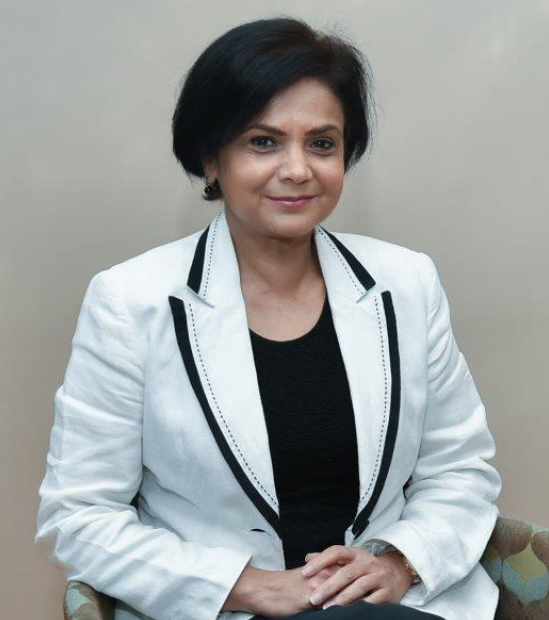
The National Prosecuting Authority (NPA) plays an important role in ensuring that the most effective legal mechanisms and support services are in place to assist victims of gender-based violence (GBV).
National Director of Public Prosecutions Advocate Shamila Batohi, who heads the NPA, says addressing violence against women and children is one of the NPA’s
priorities.
“The reality is that we are facing a war against women and children in our country. An average of two children and seven women are killed every day; an average of 114 rapes are recorded by the police every day,” she says.
Batohi adds that the situation is actually worse than the numbers show, with many cases going unreported.
She believes that law enforcement agencies can do more to curb GBV.
“But the reality is that it is reactive and responsive in nature – we come in only after the person has been victimised.”
Batohi says addressing GBV effectively needs a proactive, whole-of-society approach.
The NPA is involved in reviewing the legal and policy framework that governs how GBV and femicide is addressed.
Laws that protect women and children against violence are also being strenghtened.
Parliament is finalising the Criminal Law (Sexual Offences and Related Matters) Amendment Act and the Domestic Violence Amendment Bill, to which the NPA contributed significantly.
The Thuthuzela Care Centre model, which is led by the NPA’s Sexual Offences and Community Affairs Unit, in partnership with national government departments and donors, is working towards the prevention, response and support for sexual and GBV victims.
“The integrated approach to dealing with sexual and GBV matters is that of respect, comfort, restoring dignity and ensuring justice © to ensure adequate care, support and healing for the victims of GBV and to reduce secondary victimisation, while increasing the prospects of a successful prosecution in reported cases,” says Batohi.
For assistance with GBV-related crimes, contact the GBV Command Centre at 0800 428 428 or *120*7867# from a cellphone. Persons with disabilities can SMS ‘help’ to 31531.
New fund to assist black farmers
New fund to assist black farmers LondekileBlack farmers who have historically been unable to access financing to grow their operations are being given a helping hand.
Government has set aside R1 billion to help black farmers become commercial farmers.
The Industrial Development Corporation (IDC), in partnership with the Department of Agriculture, Land Reform and Rural Development (DALRRD), launched the Agri-Industrial Fund recently.
The fund, which is part of President Cyril Ramaphosa’s economic stimulus package for small-scale farmers, is being financed by DALRRD and run by the IDC.
It aims to help establish black-owned, large-scale commercial agricultural projects.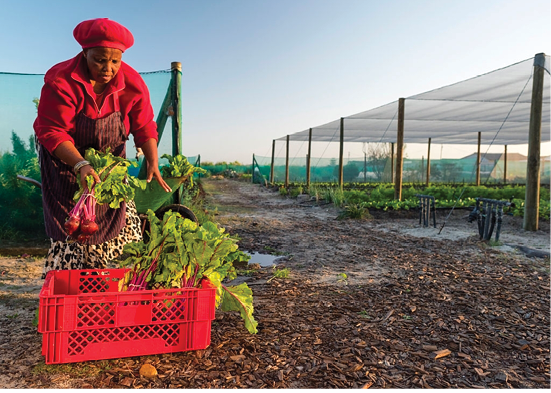
The fund will focus on establishing competitive contract growers in the poultry value chain; protein value chains, such as poultry, pork and beef; and other agro-processing ventures that support the Agriculture and Agro-processing Master Plans.
The initiative will also focus on enabling export-quality produce to be grown on community-owned agricultural land (restituted or communal properties) across the country.
“The broader agricultural sector is central to the recovery of the local economy but, most importantly, its objectives are consistent with the IDC’s role in increasing the number of black commercial farmers,” says the IDC’s Chief Executive Officer Tshokolo Nchocho.
DALRRD Acting Director General Mooketsa Ramasodi says the IDC understands the funding constraints black farmers face.
“We believe that this partnership will help break down some of the barriers to entry and elevate these farmers to become fully-fledged commercial farmers,” he says.
Through this partnership, funds will be provided to qualifying end beneficiaries as grants. There will be no pricing and subsidy implications from a risk perspective – a factor Nchocho says is the fund’s biggest drawcard.
“This key component of the fund aims to eliminate barriers to entry, thus attracting a significant number of black farmers looking to scale up their commercial farming activities,” Ramasodi adds.
The fund will be used alongside the IDC’s other internal funding products to support businesses through a blended approach.
For more information contact the IDC at 0860 693 888 or the DALRRD at 012 319 6000 or www.idc.co.za
Poultry plan a masterstroke for local farmers
Poultry plan a masterstroke for local farmers SiboneloSouth Africa’s chicken and egg industry is soaring thanks to the Poultry Master Plan.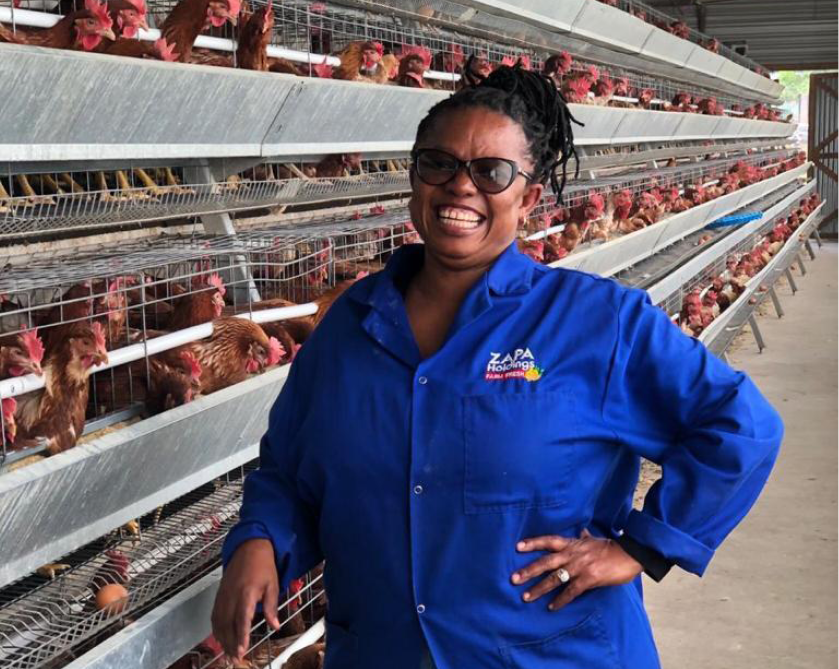
When Beverly Mhlabane took a trip to the shop to buy eggs, little did she know by the time she returned home an idea would be hatched for her own successful business.
“One day I went to the shop to buy eggs and found the eggs to be very expensive so I decided to buy 10 egg-laying chickens so we could get eggs for the house,” she says.
A chicken lays an egg every 26 hours, which meant that Mhlabane would get an average of eight or nine eggs a day.
Two months later, she started selling the eggs to neighbours. This led to her converting her home garage into a chicken battery house. At the time she also had a backyard vegetable garden.
Mhlabane, a former engineer, always had plans to leave the corporate world to start her own property business. In 2014, a while after acquiring her chickens, she bought two hectares of land in Benoni, Gauteng, with the intention to build apartments.
However, she couldn’t go through with her plan because the land was demarcated for agricultural use. She decided to expand her small farming enterprise instead.
Long process
A lack of infrastructure such as fencing, water tanks and electricity meant she only started using the land in 2016.
The 49-year-old remembers how she used search engine Google to conduct research on farming.
Her baby steps paid off and today, she is the proud owner of Zapa Farm, a successful commercial agricultural enterprise.
She progressed from using her two hectares of land to increase her egg production and grow spinach, kale, green pepper and tomatoes, which she sold locally, to eventually installing two vegetable tunnels, cultivating 1.5 hectares and building 5 000- and 2 000-capacity layer houses.
The farm supplies four Wimpy restaurants, Pick n Pay, a Holiday Inn hotel and local spaza shops, among others.
“However, we have a shortage as our demand exceeds our capacity and, as a result, we source eggs from other local producers. We have an approved environmental impact assessment for 120 000 layers and therefore need capital for the expansion,” she says.
Poultry Master Plan
Mhlabane had help in becoming a successful farmer. She is one of the many emerging farmers benefitting from the Poultry Master Plan, which was developed by government and industry stakeholders, including poultry producers, farmers, processors, exporters, importers and organised labour.
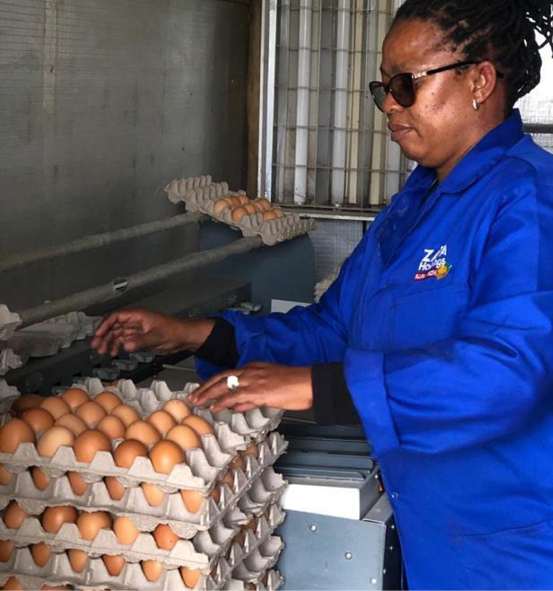 Signed in 2019, the plan aims to grow jobs in the industry through a number of measures that will be introduced over the next few years.
Signed in 2019, the plan aims to grow jobs in the industry through a number of measures that will be introduced over the next few years.
It was as a result of the plan that the South African Poultry Association (SAPA) paid for Mhlabane’s water use licence and provided her with egg production training.
Support for farmers
SAPA General Manager Izaak Breitenbach says the industry has invested millions into supporting black farmers and growing poultry production by 5%. In just 12 months, 13 black contract grower farmers were established and 960 jobs were created.
“The industry has invested R870 million to create markets for 50 black contract growers and to facilitate exports to create local jobs. The industry has also done and paid for business studies for 19 black farmers who are in a programme with the Department of Agriculture, Land Reform and Rural Development,” he says.
Forty independent black farmers are also being given poultry-related advice and training.
“The industry also has a database of 670 small, medium and micro enterprise farmers who we assist with relevant information,” he says.
In addition, SAPA has made a book available to teach farmers about poultry production and developing their own business plans.
Chicken producers have committed to R1.5 billion in fresh investment in their own production facilities withinw the next four years, which should create an additional 4 000 jobs.
The industry will also invest R1.7 billion into the establishment of 50 commercial-scale contract farmers. This investment will be supported by the industry and various government agencies. SAnews.gov.za
Quality healthcare for Graskop
Quality healthcare for Graskop SiboneloGraskop residents and surrounding communities in Thaba Chweu, Mpumalanga, are set to benefit from a new state-of-the-art clinic that was recently handed over to the Mpumalanga Department of Health by the South African Forestry Company Limited (SAFCOL).
SAFCOL’s Chief Executive Officer Tsepo Monaheng committed to building the Glory Hill Clinic for the community after the forestry company held a Mandela Day activity at the old clinic last year. At the time, an old community hall was being used as the local clinic.
Approximately R3 million was invested by SAFCOL to construct the new 266m² clinic, which consists of a reception area and seven consulting rooms, with modern finishes; air conditioning; adequate onsite parking and a spacious dispensary.
Improved access
It will benefit about 4 500 people from Graskop and surrounding communities, who now have improved access to adequate healthcare.
“This is a wonderful journey that we have been through. We have a responsibility to impact people’s lives positively and we are sure that the clinic will not only do this, but it will also have a positive impact on surrounding communities too,” said Monaheng.
Mpumalanga’s Health MEC Sasekani Manzini and Thaba Chweu Local Municipality Executive Mayor Fridah Nkadimeng attended the official handover of Glory Hill Clinic recently.
“We are extremely pleased to be receiving this donation from SAFCOL. It is a major boost to our ongoing fight against the Coronavirus Disease (COVID-19), which has changed the world as we knew it and has become a dominant factor in our lives,” said MEC Manzini.
She explained that the clinic, which will be managed by the department, will improve citizens’ lives and lessen the burden on these poor communities.
“It’s always encouraging when businesses give back to their communities© The clinic offers a highly effective solution to fulfil our critical need of ensuring that we deliver quality healthcare services to our people, as it says in our Bill of Rights.
“Everyone has the right to access healthcare services, including reproductive healthcare, and no one may be refused emergency medical treatment,” said MEC Manzini.
She added that the clinic showed the result of the public and private sectors working together for the transformation and development of the economy.
“It offers us an opportunity to strengthen the existing health system and deliver a package of essential healthcare services,” said MEC Manzini.
Rebuilt school to help learners thrive
Rebuilt school to help learners thrive LondekileUlulation and tears of joy were the order of the day when KwaZulu-Natal Premier Sihle Zikalala cut the red ribbon to mark the official opening of the state-of-the-art Pholela Special School in Bulwer in KwaZulu-Natal recently.
The school will cater for the needs of 350 learners with intellectual, physical and sensory disabilities.
The school was rebuilt through an investment of R220 million and boasts an administration block, activity block, media centre, computer lab, special needs classrooms and therapy, multi-purpose centres and accommodation facilities for learners and teachers.
The building also includes a consulting dispensary with sickbays, male and female game rooms, kitchen, dining hall and laundry. The external works consists of covered concrete walkways, seating areas and basketball and netball courts.
Premier Zikalala said the school is a milestone achievement for a caring and people-centred government.
“We are unable to contain our joy because today, in word and deed, our government is able to demonstrate that we treasure all our learners equally. Today, we can attest that with dedicated support, all children can learn and reach their full potential.
“We can confidently say that this school is a cornerstone of our vision for an inclusive education and training system. Such a system is geared to actively work to minimise barriers to learning and to meet the needs of all learners,” he said.
The Premier added that the rebuilding of the special school and turning it into a state-of-the-art educational institution in a deep rural area like Bulwer, is part of ensuring that development restores the dignity of people, especially people in rural areas.
“As government, we are supporting rural development and growth through the delivery of critical social infrastructure like schools.”
He said 22 schools in other districts have also been identified for renovations and upgrades. This is to ensure that learners with disabilities receive quality, relevant education and skills in safe environments. SAnews.gov.za
Religious community vital in the fight against COVID-19
Religious community vital in the fight against COVID-19 SiboneloRecently many South Africans of faith have joined others across the world in important religious observances. Members of the Jewish faith celebrated Pesach, Christians observed Easter and Muslims will soon be observing the holy month of Ramadan. 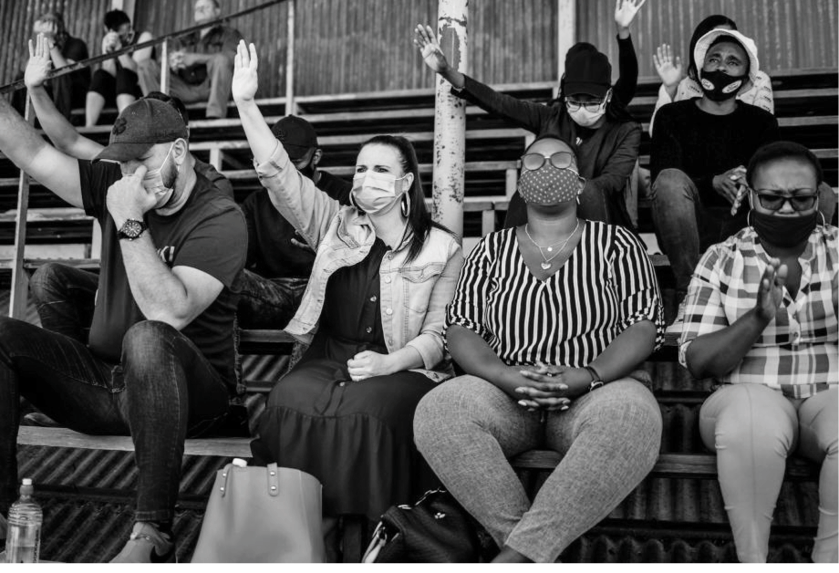
For the second year, these occasions have been marked in the midst of a devastating global pandemic that has cost the lives of more than 2.5 million people across the world.
Faith-based organisations have been vital to our national response to the disease, not only providing spiritual comfort and guidance, but also by caring for those most vulnerable to the effects of the pandemic, including through the provision of food, shelter and other social services.
Religion plays an important role in the lives of millions of South Africans, and congregational worship forms a vital part of their religious practice.
Being able to gather for religious services is also a welcome respite from a period of great hardship for individuals, families and communities.
It is understandable that after more than a year of labouring under restrictions on religious gatherings that the faith community are keen for a return to a semblance of normality.
In recognition of the importance of congregational worship to the lives of our people, government has been engaging with the faith community.
Leaders of the faith community understand and appreciate the very real danger of a new wave of COVID-19 infections. Since the outbreak of the pandemic, religious organisations have taken proactive and positive measures to limit the spread of the disease among worshippers.
Another important factor is that during the various alert levels, religious organisations have incurred substantial financial losses that threaten their sustainability. As government we remain committed to working with the faith community to find workable solutions.
At the same time, public health and safety must be our paramount consideration.
The religious community has shown innovation and initiative in the holding of worship at a time when there was a great deal of uncertainty over the trajectory of the pandemic.
Congregational services were held online and worshippers were encouraged to pray in their homes instead of attending services. This greatly aided the national effort to contain the spread of the disease.
Religious leaders played a pivotal role in encouraging public adherence to health measures around important customary and cultural rituals like burials.
By equal measure, our people have demonstrated their commitment to adhering to public health protocols and to social distancing. And they correctly appreciate that they must continue to avoid large gatherings.
We are now at a time where precaution is needed above all. The Coronavirus pandemic has not been eliminated, either in our own country or around the world. The threat of a third wave is real and ever-present.
International experience has taught us that we should not tempt fate. Many countries have eased restrictions, only for there to be resurgences, necessitating the imposition of even harsher restrictions.
Large gatherings, whether religious or otherwise, have the potential to spread the virus, despite the application of measures around social distancing and sanitising.
Millions of South Africans have been observing an important tenet of their faith. In a country that enshrines the right to religious freedom, all effort must be made to support our people in the exercise of this right. And in exercising this right, we need to make sure that we do not place the rights or the lives of others at risk.
This is a principle that the religious leaders I met with fully support and appreciate. They understand the responsibility of all people of faith – indeed of all South Africans – to observe the practical measures put in place to protect people’s health and save lives.
For more than a year, we have worked together as a society to contain this pandemic. Now as we work to overcome it, we need to reaffirm our shared determination to act responsibly and cautiously.
In doing so, we will be giving practical effect to the universal messages of hope, salvation, freedom and solidarity that will be spoken of in the churches, synagogues, mosques and homes of our land in the days and weeks ahead.
Taking sneakers from the village to the world
Taking sneakers from the village to the world SiboneloTaking sneakers from the village to the world
Mabushe Tsima (25) realised his dream of owning a sneakers brand in October last year, when he established Pt Wear.
It is a dream Tsima, from Ngwanamatlang in Sekhukhune in Limpopo, has been pursuing since 2018, although in the beginning he didn’t know how to go about it.
“There were not many local factories that had the capacity to make the sneakers I wanted. I did some research on how the local market operates and how I could find my space in it,” he says.
With the help of his single mother, Tsima raised some capital and started the manufacturing process.
“We focus on tracksuits and sneakers. Sneakers are an innovative and trendy way to tell our story. We want to be a culture brand.
“The first sneakers we released was the Sekhukhune Edition 1, which is named in honour of the great Bapedi king and his kingdom,” says Tsima.
He explains that his aim is to always honour African history, its people and its leaders.
“We are telling a story from an African perspective, by an African. We proudly speak for the village dream – our mission is to always make the village kid see that it’s possible to make it in life, no matter where you’re from. Our slogan is thus ‘From the village to the world’,” he adds.
Tsima says his journey has not been easy.
“Capital is at the centre of problems for us as young entrepreneurs. We have great ideas, but they are poorly executed due to high manufacturing expenses.
“We have had to destroy many sneakers while putting our concept together, this was a huge loss in terms of costs, which we are still recovering from.”
His message to the youth is not to wait. “Draft that logo and start now. Visit all the factories you can. Even though capital is important, starting is more important. Entrepreneurship is the future, especially for a black child," Tsima adds.
For more information about Pt Wear, visit www.ptwear.co.za.
The face of future furniture design
The face of future furniture design LondekileA KwaZulu-Natal company and three University of Johannesburg (UJ) students walked away with the top prizes in the recent national Furniture Design Competition hosted by the Department of Trade, Industry and Competition.
The annual competition was presented in partnership with Proudly South African, the South African Furniture Initiative, Coricraft Furniture, Mecad Solidworks, Furntech Centre of Excellence, Lewis Stores, the African Institute of the Interior Designer Professions (IID) and Tsogo Sun Hotels.
The theme of this year’s competition, which saw contestants competing for honours in the students and established manufacturers categories, was ‘This is mine and these are ours’.
The contestants were asked to design furniture for four young, newly employed people who have come together to rent a modest apartment. With a limited budget, the designers were required to design a range of multipurpose, functional furniture.
Ian Perry, managing director of Homewood, a Durban-based company that manufactures handcrafted wood furniture, took the first prize in the manufacturer’s category.
Homewood’s winning pieces were a multifunctional couch and coffee table that open up into either a bed and pedestal, work desk and chair, storage unit, chest of drawers, bookshelf or dining table.
According to Perry, the furniture offers savings in cost and space and is 100% South African made. The timber was sourced from local waterways, the design was local and the furniture was handcrafted by local people, he says.
“It is always good to show that you know what you are doing and that you are good at what you are doing,” he says.
Homewood received a year’s free membership of Proudly South African, a year’s membership of the IID, a graphics tablet and an opportunity to participate in exhibitions.
UJ students Amukelani Mathebula, Michal Sushan and Mikhayla Peterson scooped the first prize in the students’ category.
The students, who were all doing their Honours in Industrial Design last year, designed a multipurpose furniture range comprising a folding chair, table and couch with storage underneath.
They received a one-year internship in the furniture industry and a six-month Furniture Design Incubation Programme from Furntech.
“Winning the competition has benefited us by opening us to a lot of opportunities, such as the internship, which will allow us to grow as designers,” says Peterson, speaking on behalf of the students.
“The media exposure has also shone a spotlight on our personal achievements and highlighted our capabilities to the nation. Winning has also validated our choice of career path,” she adds.
The future is in farming
The future is in farming LondekileWomen are encouraged to dig in and grow a brighter future through farming.
Primrose Makgatho (43) of the AP Agricultural Cooperative in Bronkhorstspruit says farming is one of the most sustainable jobs in the world because no day passes without people needing a meal.
“The growth of our country’s economy relies heavily on agriculture, and I would like to encourage women, youth and people living with disabilities to plough away to secure their future,” she says.
Makgatho discovered her passion for farming in 2010 when her husband asked her to join his farming business. She initially assisted with the bookkeeping, but later realised that the agriculture sector holds opportunities for women.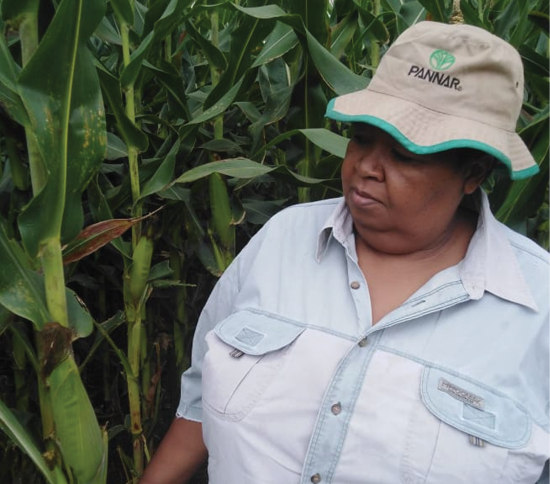
“In 2018, we successfully applied for land from the Gauteng Department of Agriculture and Rural Development to start our women-led cooperative.
“I grew up in the rural areas, so the love of agriculture was always hidden in me from an early age, although I took long to realise it because I spent most of my career running a construction company.”
Her business specialises in crop and animal farming and is benefitting from the department’s economic stimulus package.
“The department has assisted our farm by granting us the land on which we operate. It also purchased farming equipment and agricultural inputs worth R4 million for our farm, including tractors, planters, boom sprays, offset discs and bulk trailers,” she says.
Makgatho says female farmers in South Africa are seeing the light in the previously male-dominated agricultural sector.
“There is a huge opportunity for young female farmers. We have young people on our farm who we are mentoring, and government has opened doors for more young people to consider careers in farming, so that is encouraging. I would advise young women to be passionate and focused,” she says.
Makgatho is also the chairperson of Women in Agriculture and Rural Development in Gauteng.
To find out more about the stimulus package, contact the Department of Rural Development and Land Reform at 012 312 8911 or www.drdlr.gov.za.
Upskilling learners for 4IR
Upskilling learners for 4IR SiboneloChildren are set to get to grips with coding while still at school to prepare them for 4IR work opportunities.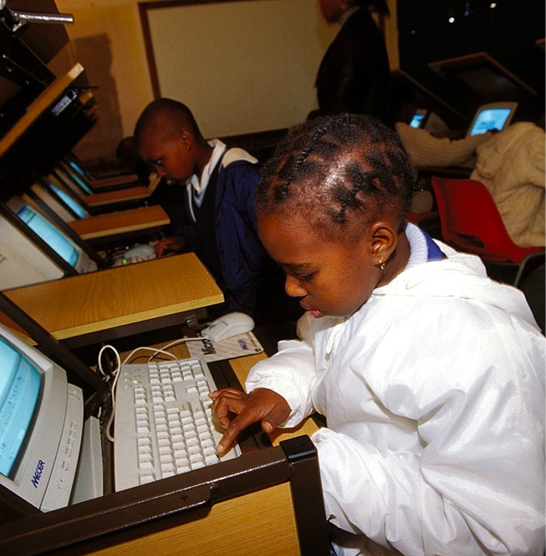
The Department of Basic Education is piloting a coding and robotics curriculum in 1 200 schools across the country, before introducing it to all public schools.
The department’s Director of Quality Learning and Teaching, Thabang Hlakula, says the coding and robotics team has embarked on an awareness and advocacy roadshow across all nine provinces to assess the state of readiness for implementation.
“Approximately 200 schools will be piloting the draft curriculum from grades R to 3 and approximately 1 000 schools will be piloting the Grade 7 curriculum during 2021,” says Hlakula.
The curriculum is in response to the Fourth Industrial Revolution (4IR), which has radically changed the way of living, learning and working.
Learners will be taught how to think critically, solve problems, work collaboratively and creatively and function in a digital and information-driven world.
“Schools must teach skills that will support the growth of the economy, enable financial inclusion and relook at critical subject areas, such as science, technology, engineering, mathematics and the curriculum in general,” says Hlakula.
At a recent virtual basic education sector lekgotla, President Cyril Ramaphosa said if South Africa wants to meet its developmental goals, it needs to provide young people with quality education that prepares them for present challenges and future opportunities.
“If we are to seize the opportunities of the 4IR, our education system must be reoriented towards its development in our country.
“It will not be possible for us to build an e-skilled economy as envisaged in the National Development Plan if we do not pay attention to subject areas at basic education level,” he said.
Hlakula says various schools will be provided with an opportunity to participate. This will include mainstream, special, full-service and multi-grade rural schools.
The programme will begin incrementally with grades R, 3 and 7 being introduced in 2021, grades 4, 6 and 8 in 2022 and Grade 9 in 2023.
The department has already completed the pilot programme in KwaZulu-Natal and will now move to other provinces.
Vaccination programme rolls on
Vaccination programme rolls on SiboneloSouth Africa’s Coronavirus Disease (COVID-19) vaccination programme is making good progress, with the second phase expected to start soon.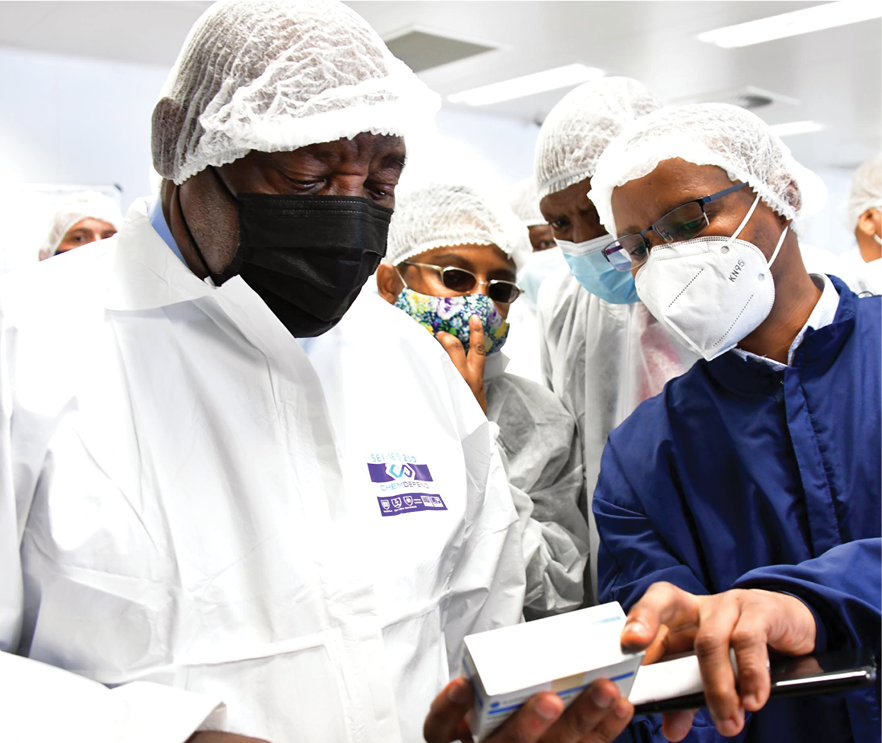
During a recent address to the nation, President Cyril Ramaphosa said Phase 2 of the programme is scheduled to start in mid-May, with registration expected to take place in April.
“Under Phase 2, we hope to vaccinate more of our people over six months,” said the President.
In line with international best practice, in Phase 2 government will prioritise those at the highest risk of hospitalisation and death, such as people over 60 and people living with co-morbidities.
“To ensure that we have supporting infrastructure over 2 000 vaccination sites have been identified across the country.
“These include general practitioners’ rooms, community clinics and pharmacies, retail outlets and in some instances, larger facilities like stadiums and conference centres,” he said.
Electronic Vaccination Data System
Government has established an Electronic Vaccination Data System to manage the vaccine rollout and direct people towards vaccination sites closest to where they live.
“This system will allow you to register, receive an appointment date and site, and receive a digital certificate or a hard copy confirming your vaccination status once vaccinated.
“Everyone that will be vaccinated will have to be registered on the system first, and you will be invited to register once you become eligible,” the President said.
Government will work with provincial and district structures and community-based organisations to register those citizens who do not have access to technology.
“We are developing mechanisms to identify and register undocumented persons so that they too can be vaccinated.
“We remain committed to keeping the nation informed on every step in the vaccine rollout process,” he said.
The country began its vaccination programme mid-February with Phase 1 focusing on inoculating health workers.
“This phase is on track to be completed within three months. More than 250 000 health workers have to date received the Johnson & Johnson (J&J) vaccine as part of the Sisonke trial,” said the President.
Various vaccines
The country has secured 11 million doses of the J&J vaccine, which is known to be effective against the dominant variants in the country.
“We have secured a further 20 million doses and are finalising the agreement with J&J. We are also finalising an agreement for 20 million doses of the Pfizer vaccine, which requires two doses. Together, this supply of vaccines will provide us with enough doses to vaccinate 41 million people,” said President Ramaphosa.
Further announcements will be made once negotiations are finalised.
“We are also in various stages of negotiations with the manufacturers of other vaccines such as Sinovac, Sinopharm and Sputnik V. Some of these manufacturers are in the final stages of the approval process for use of the vaccines in South Africa,” he said.
Government is also expected to receive its allocation of vaccine doses directly through its agreements with manufacturers from the African Union initiative.
Although there have been delays in securing vaccine supplies, the President said government is still confident of achieving its vaccination targets.
“We believe that sufficient volumes from manufacturers will be arriving in the quantities as agreed in terms of our agreements with them.”
Virus still with us
Despite the progress in the vaccination programme, President Ramaphosa cautioned that South Africans must behave responsibly as the virus it still with us.
“We must act with caution © in the days, weeks and months ahead. We do not know when the Coronavirus pandemic will be behind us, but we all know what must be done.”
He reminded South Africans that wearing a mask in public at all times, regularly washing or sanitising our hands, observing social distancing and avoiding crowds are still the most effective way of keeping the virus at bay.
Women have the freedom to make their mark
Women have the freedom to make their mark SiboneloThanks to the freedoms guaranteed in South Africa’s Constitution, there is no such thing as a man’s job anymore.
April is Freedom Month and each year, many South Africans find reasons to cherish the freedoms they didn’t have before 1994.
For the first time in the history of the country, South Africans of all races were free to vote for their democratic government on 27 April 1994. This was a turning point for the majority of South Africans who had been oppressed and excluded by the Apartheid government.
Since 1994, South Africa has progressed and become a country that values human rights for all, through advancing human development and restoring dignity.
As a South African, you now have various freedoms that are recorded in the Constitution. These include:
- Freedom and security: No one has the right to use any form of violence on you.
- Freedom of religion, belief and opinion: Whatever faith you choose to belong to, no one must stop you.
- Freedom of expression: You can say what you think and express your ideas and no one must stop you.
- Freedom of association: You may meet and associate with anyone or any group of people you choose. This includes affiliation to a political party of your choice.
- Freedom of movement and residence: You can choose where you want to live within the country and are also free to move out of the country.
- Freedom of trade, occupation and profession: You may train for any job you want and seek employment in that field.
Vuk’uzenzele spoke to three women who are enjoying the freedom of trade, occupation and profession in male-dominated fields. They would not have been allowed to do these jobs before 1994.
Nomvuyo Sokwaliwa: Maintaining buildings and repairing aircraft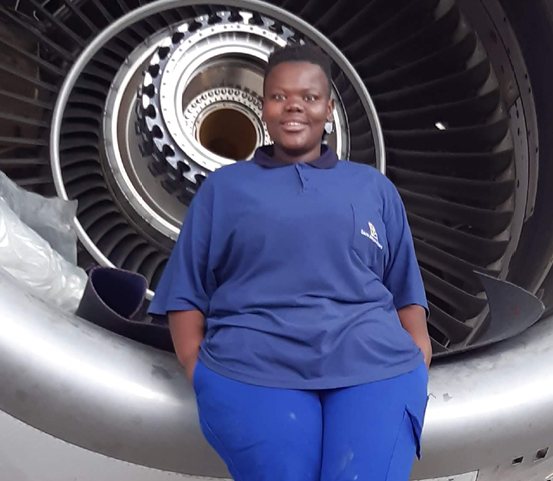
After completing her National Diploma in Building, Sokwaliwa completed her in-service training at eThekwini Municipality’s Housing Maintenance Unit. She was part of the team working on the maintenance of municipal buildings, before joining South African Airways’ Composite Aircraft Maintenance Trade Test Programme.
“We also manufactured some of the parts to replace those that could not be repaired. Doing physical work fascinates me. Going up the wing of an aircraft, sending tools and fixing dents is all fulfilling,” she explains.
Sokwaliwa says her freedom means being able to do what she wants without limitations.
“I encourage girls to go for whatever they want. Break into spaces and make your presence felt,” she says.
Welile Gumede: A farm owner at 29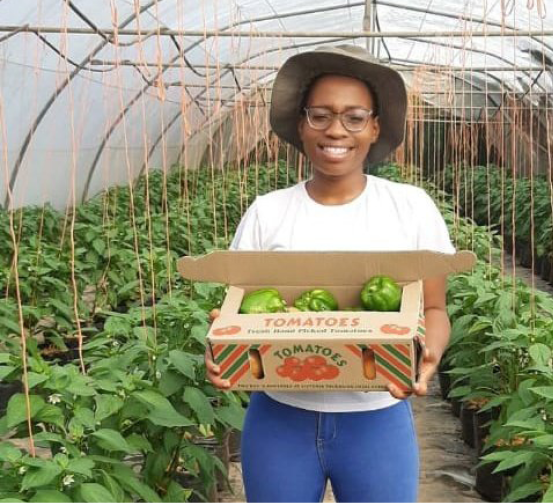
Gumede registered her company, Azowel Projects, and went searching for unused farming spaces. Together with her team, she used her hands to fix what was left of a farm and build a planting tunnel.
“I entered business competitions to secure funding and with the prize money, was able to set up and plant more tunnels. We qualified for funding and secured it through our work on the ground,” she says.
Gumede says her freedom is the ability to think outside of what one has been taught and break barriers of entry into the business world.
“Being able to have a share in a market that has been dominated by other races is true freedom for me,” Gumede adds.
Thobile Sithole: An electrician who beat the odds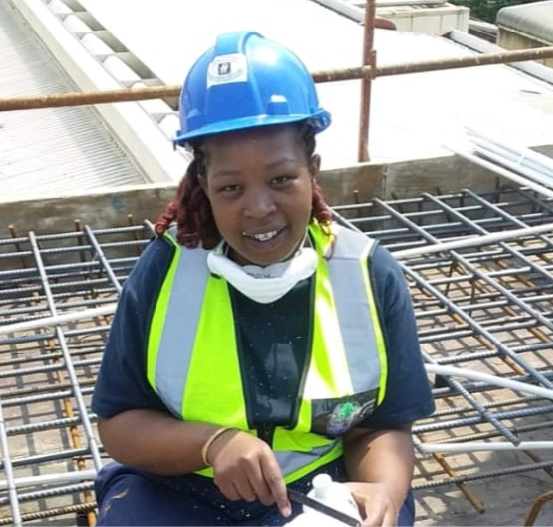
Growing up in rural Nongoma, Sithole had only seen a few female electricians. This drove her to become an electrician.
“At home, I was told I would never make it because what I was aspiring to do isn’t child’s play,” she says.
Sithole’s job includes installing galvanised and PVC conduit pipes, cable joining, wiring, balancing metering panels and wiring star delta connections.
“Freedom to me means I mustn’t hold back. If I want something, I must go for it because we are living in a new South Africa. We have the freedom of choice, speech and being who we want to be,” she says.